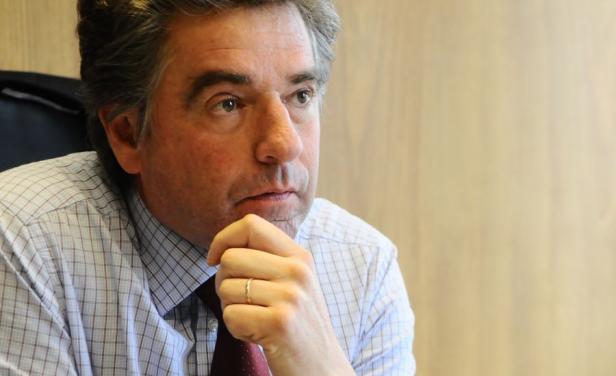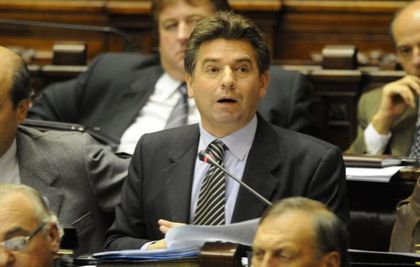Gerardo Amarilla, Uruguayan MP and former President of the parliament, was one of the first evangelical Christians in his country in such a high political position. He speaks about the challenges and opportunities for Christians in politics.
 Gerardo Amarilla.
Gerardo Amarilla.
Gerardo Amarilla was born in 1969 and grew up in a Baptist local Christian community in Montevideo (Uruguay). He began his political career when he moved to the city of Rivera. At that time, there were no evangelicals in the national parliament.
Amarilla, a deputy of the National Party of Uruguay, member of the political movement “Todos” (Everyone), was the first evangelical Christian to become President of the Chamber of Deputies (the national parliament). He held that position until March 1, 2017.
In an interview with Spanish online newspaper Protestante Digital, he recalls how “churches had a negative attitude towards politics” in the past, but that “has changed […] now Evangelicals work in politics, not proselytising, but trying to influence with their values and principles in the public arena, to serve others in the best way.”
In the interview he gave to Pedro Tarquis in his visit to Madrid (Spain), Amarilla emphasised the importance of being prepared, because “we have some bad experiences, with Christians who were not a good testimony for the church, because they entered in politics without experience and participated in some negative events.”
“Jesus, who has said many things about politics, has a great influence in my political career. Because of Him, I am motivated and inspired to work in politics, to serve others”, Amarilla says.
According to Amarilla, “the politics is a missionary activity, because we are trying to bring the Kingdom values to the government, so that we can bless our countries."
Question. When you were elected as a deputy, you said that you were “peculiar” in the evangelical world. Why?
Answer. Because when I started to work in politics, in the 80's, there were not many evangelical Christians working in politics. We prayed for the politicians at church, but churches had a negative attitude towards politics. Christians should not work in politics, because it was something dirty, not for Christians.
Q. Has that vision changed in the churches of Uruguay?
A. It has changed. By the grace of God, I was elected as a deputy in 2010, and that generated a public debate.
In the last elections, three evangelical candidates were elected. Although many talked about “an evangelical bench” , the truth is that we are from different parties, we get along well, but we have our own ideas. In Latin America we have some bad experiences, with Christians who were not a good testimony for the church, because they entered in politics without experience and participated in some negative events.
 Gerardo Amarilla in the Uruguayan Parliament.
Gerardo Amarilla in the Uruguayan Parliament.In Uruguay things are changing, working in politics in not seen as something negative any more. Evangelicals work in politics with their faith and values, not proselytising, but trying to influence with those values and principles in the public arena, to serve others in the best way.
Q. You talked about bad experiences of evangelicals in politics. Brazil is an example of that, with many corruption cases. What recommendations do you have for evangelicals who want to have a political career? How can they be prepared spiritually and professionally?
A. It is very important to know where you are going to work, and be prepared. When a Christian is called to be a missionary in an African Muslim country, in the desert, for instance, he should be prepared and know the language, the climate, the resources he might have, how to interact with the Muslim majority. It is the same with politics, you must be prepared and study. You need to know your responsibilities, incompatibilities, the law, and to know the goals you want to achieve.
Q. In March 2006, you were elected as the President of the House of Representatives, a position that needs the support of all the parties. How did the fact that you are Christian influence in your election?
A. It was my second time as a deputy, the parties already knew me. I was the first evangelical in that position, and many looked at me thinking that I was going to start praying or reading the Bible, or that I wanted to preach them.
But when they realise that, like them, I wanted to work for our country, trying to do my best, they started to believe in me for what I did and not for what they thought I was. Because I work hard, I studied the things we dealt with. I had differences in some issues, and I fought for them, but with respect.
There was a big controversy in the media, because in some interviews I said that the law of God is above human law, and some people did not understand it, but afterwards they saw that I did good things. In general the reactions were positive.
Q. You have been questioned for your ideas against the abortion, gender ideology or gay marriage. How do you see these areas of the Christian ethics that are against what many understand as rights?
A. I have some principles that I am not going to hide or abandon, just to be politically correct. I do not vote to gain the favour of the voters, I vote what I believe.
I defend human life, I think it is a fundamental right; I defend the traditional family of man and women that are united to create life. Because of that, some sectors have accused me of being conservative and a fundamentalist, but I believe that it is worthy to fight to defend the life and the family, and I will keep fighting for it.
Q. Many times politicians have to choose the lesser of two evils. Do you think is it correct to support the lesser evil?
A. It is a bitter situation. Sometimes any of the two possible solutions satisfies you and you try to look for an alternative, but it is not possible, so that you need to choose the lesser evil.
Q. At the beginning of your political career, you denounced some people of corruption who were investigated and finally declared guilty. Do politicians who fight against corruption pay a hight price for it?
A. Yes. The issue of integrity goes beyond the law. It is the way you deal with your influence. Sometimes your decisions do not make you rich, but influencing in certain groups or persons can also be corruption.
The countries can vote international transparency laws, but it is so important that when people vote, they vote honest politicians.
Q. What politicians of the Bible have influenced you?
A. I have some, depending on the moment. Moses is a reference because he led the people. David, Joseph, Daniel, the courage of Queen Ester...
All of them are great examples, but the key figure, who has said many things about politics, is Jesus. Because of Him, I am motivated and inspired to work in politics, to serve others.
Q. Is there anything else you want to say?
A. Just that the public arena is a mission field for us Christians. Sometimes we think about being missionaries in this country or the other, but the politics is also a missionary activity, because we are trying to bring the Kingdom values to the government, so that we can bless our countries.

Las opiniones vertidas por nuestros colaboradores se realizan a nivel personal, pudiendo coincidir o no con la postura de la dirección de Protestante Digital.
Si quieres comentar o